
People's Artist of the USSR, also sometimes translated as National Artist of the USSR, was an honorary title granted to artists of the Soviet Union.

Arkady Isaakovich Raikin was a Soviet stand-up comedian, theater and film actor, and stage director. He led the school of Soviet and Russian humorists for about half a century.
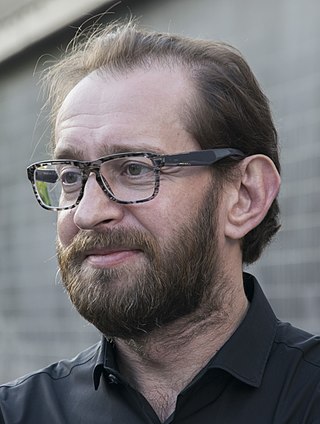
Konstantin Yurievich Khabensky, PAR is a Russian actor of stage and film, director and philanthropist.

The Russian Institute of Theatre Arts (GITIS) is the largest and oldest independent theatrical arts school in Russia. Located in Moscow, the school was founded on 22 September 1878 as the Shostakovsky Music School. It became the School of Music and Drama of the Moscow Philharmonic Society in 1883, was elevated to the status of a conservatory in 1886, was renamed the Institute of Music and Drama in 1918, and was known as the Lunacharsky State Institute for Theatre Arts (GITIS) from 1934 to 1991.

A drama school, stage school or theatre school is an undergraduate and/or graduate school or department at a college or university; or a free-standing institution ; which specializes in the pre-professional training in drama and theatre arts, such as acting, design and technical theatre, arts administration, and related subjects. If the drama school is part of a degree-granting institution, undergraduates typically take an Associate degree, Bachelor of Arts, Bachelor of Fine Arts, or, occasionally, Bachelor of Science or Bachelor of Design. Graduate students may take a Master of Arts, Master of Acting, Master of Science, Master of Fine Arts, Doctor of Arts, Doctor of Fine Arts, or Doctor of Philosophy degree.
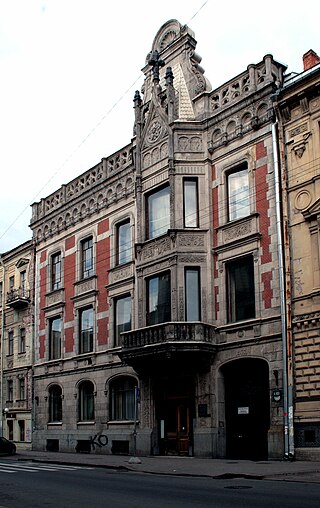
The Russian State Institute of Performing Arts, formerly known as St Petersburg Theatre Arts Academy, formerly Leningrad State Institute of Theatre, Music, and Cinema (LGITMiK), is a theatre school in Saint Petersburg. It is the oldest Russian state theatre school, being founded in 1779, and has incorporated several mergers of other institutions during its history, including the Ostrovsky Leningrad Theatre Institute and the Leningrad Institute of Art History.

Maly Theatre is a theatre in Moscow, Russia, principally associated with the production of plays. Established in 1806 and operating on its present site on the Theatre Square since 1824, the theatre traces its history to the Moscow University drama company, established in 1756. In the 19th century, Maly was "universally recognized in Russia as the leading dramatic theatre of the century", and was the home stage for Mikhail Shchepkin and Maria Yermolova. 40 of Alexander Ostrovsky's 54 plays premiered at Maly, and the theatre was known as The House of Ostrovsky. The Maly Theatre in Moscow and Alexandrinsky Theatre in Saint Petersburg "to a great extent determined the development of Russian theatre during the 19th and 20th century".

Fyodor Viktorovich Dobronravov is a Soviet and Russian stage and cinema actor, Honored Artist of Russia (2002), People's Artist of Russia (2011). He is an actor, known for Kadetstvo, Playing the Victim (film) (2006) and The end of the Belle Époque (2015).
Nikolai Nikolaevich Dobrynin is a Soviet and Russian stage and cinema actor, Meritorious Artist (2002).
Raikin is a surname. Notable people with the surname include:

Mikhail Savoyarov was a Russian chansonnier, composer, poet, comic actor and mime. In the first quarter of the 20th century he was a famous satirical singer-songwriter. His popularity peak was in the years of war (1914–1917) when he began to be called the «King of eccentrics». It was also the time when he became friends with Aleksandr Blok. Considering that the period of his greatest popularity was almost at the exact time as the brief period of renaming the capital, Savoyarov can be called the Petrograd artist in the strict sense of the word.
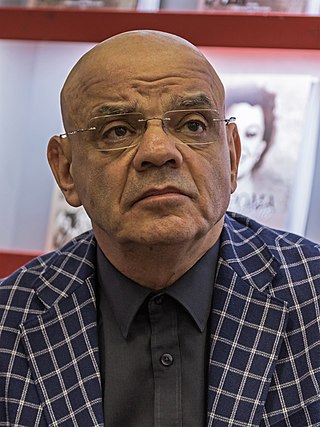
Konstantin Arkadyevich Raikin is a Russian actor and theatre director, the head of the Moscow Satyricon Theatre. Konstantin Raikin has been honoured with the titles Meritorious Artist of Russia (1985) and the People's Artist of Russia (1993). Among his accolades are the Russian State Prize (1995), the Order "For Merit to the Fatherland" and the Golden Mask award. He is the son of Arkady Raikin, the legendary Soviet actor and stand-up comedian.
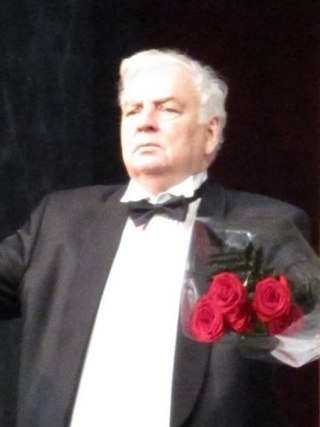
Mikhail Mikhajlovich Derzhavin(Russian: Михаи́л Миха́йлович Держа́вин; 15 June 1936, Moscow – 10 January 2018, Moscow) was a Soviet and Russian actor.
Nikolay Selivesterovich Khlibko was a Soviet and Russian theatre, cinema actor and artistic director.

Yerevan State Pantomime theatre was founded in 1974. The status of the State Theatre received in 1983.
Nataliya Gennadievna Vdovina is a Russian film and stage actress. She is best known for her performance as mother in The Return. She also won several awards for her performance on stage.
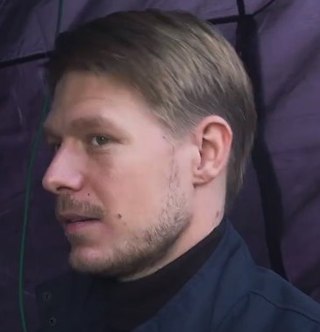
Nikita Mikhailovich Yefremov is a Russian theatre actor, voice acting and dubbing actor, known for his roles in television series Londongrad (2015), The Thaw (2013) and in the film Cinderella (2012). He is a son of Mikhail Yefremov and a grandson of Oleg Yefremov.
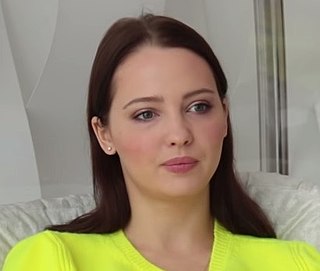
Yulia Olegovna Khlynina is a Russian actress.

Pavel Ustinov is a Russian actor. He is well known for being arrested at the 2019 Moscow protests and then falsely accused of assaulting a police officer, despite videographic evidence proving his innocence. He was then sentenced to 3.5 years in prison. This has led to widespread public backlash, from teachers to priests, and has resulted in the Russian courts commuting his prison sentence and granting him parole.

Vladimir Mikhailovich Tatosov was a Russian stage, television, voice and film actor. He had an honorary title People's Artist of the RSFSR (1991).
















